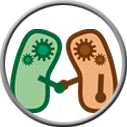Team:Calgary/Project/Acomplishments
From 2011.igem.org
(Difference between revisions)
Emily Hicks (Talk | contribs) |
Emily Hicks (Talk | contribs) |
||
| Line 7: | Line 7: | ||
<b>The University of Calgary iGEM Team has had many accomplishments this Summer</b><br><br> | <b>The University of Calgary iGEM Team has had many accomplishments this Summer</b><br><br> | ||
<b>In our promoter project...</b><br> | <b>In our promoter project...</b><br> | ||
| - | We designed a novel protocol to identify small hydrophobic molecule interacters. We were able to successfully biotinylate a naphthenic acid, suggesting that we may be able to biotinylate other small hydrophobic molecuels to screen for interactors in the search for sensory elements. <br> | + | We designed a novel protocol to identify small hydrophobic molecule interacters. <br> |
| + | We were able to successfully biotinylate a naphthenic acid, suggesting that we may be able to biotinylate other small hydrophobic molecuels to screen for interactors in the search for sensory elements. <br> | ||
Identified a gene that is upregulated in the presence of NA's, suggesting a possible promoter regions.<br><br> | Identified a gene that is upregulated in the presence of NA's, suggesting a possible promoter regions.<br><br> | ||
<b>In our Reporter Project...</b><br> | <b>In our Reporter Project...</b><br> | ||
Revision as of 10:33, 28 September 2011









Accomplishments

The University of Calgary iGEM Team has had many accomplishments this Summer
In our promoter project...
We designed a novel protocol to identify small hydrophobic molecule interacters.
We were able to successfully biotinylate a naphthenic acid, suggesting that we may be able to biotinylate other small hydrophobic molecuels to screen for interactors in the search for sensory elements.
Identified a gene that is upregulated in the presence of NA's, suggesting a possible promoter regions.
In our Reporter Project...
We characterized a novel reporter function for the lacZ gene using an electrochemical output.
In our Chassis project...
We characterized a Pseudomonas-E. coli conjugation construct
Submitted parts and protocols for future work in microalgae and Pseudomonas
In our promoter project...
We designed a novel protocol to identify small hydrophobic molecule interacters.
We were able to successfully biotinylate a naphthenic acid, suggesting that we may be able to biotinylate other small hydrophobic molecuels to screen for interactors in the search for sensory elements.
Identified a gene that is upregulated in the presence of NA's, suggesting a possible promoter regions.
In our Reporter Project...
We characterized a novel reporter function for the lacZ gene using an electrochemical output.
In our Chassis project...
We characterized a Pseudomonas-E. coli conjugation construct
Submitted parts and protocols for future work in microalgae and Pseudomonas

 "
"






